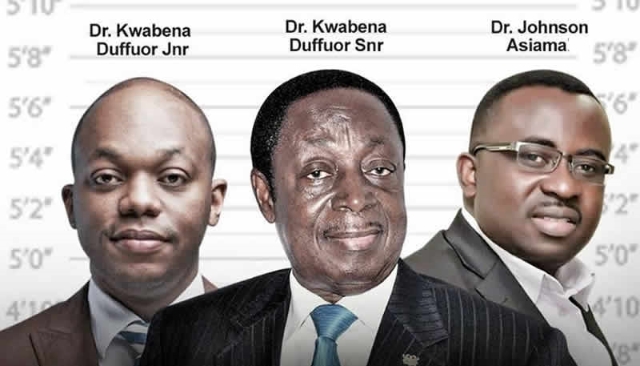UniBank Collapse: Trial of Kwabena Duffuor, Other individuals take an unexpected turn
The court learned during cross examination that the financial reports submitted to the BoG went through Unibank’s internal processes, thereby implicating the entire management team in the misreporting.
- Advertisement -
The trial of Dr. Kwabena Duffuor and several other individuals involved in the Unibank case has taken an unexpected turn, revealing a web of what is said to be fraudulent practices that allegedly led to the downfall of the prominent Ghanaian bank. The accused individuals face charges of fraudulent breach of trust, dishonest appropriation, money laundering, and conspiracy to commit crime, among others.
During the proceedings at the High Court’s Criminal Division of the Court of Appeal, the Director of Public Prosecution (DPP) representing the Republic presented a compelling case against the defendants. The court heard testimony from the first prosecution witness, Nii Amanor Dodoo, the appointed Receiver of Unibank.
- Advertisement -
Mr Dodoo’s evidence shed light on a series of allegations, including the creation of fictitious loans totaling over GHS 1 billion in the names of known bank customers. These loans were said to have subsequently ben manipulated and misappropriated by Elsie Dansoa Kyere, the former Head of Corporate Banking, and Benjamin Ofori, the former Executive Head of Credit Risk at Unibank.
- Advertisement -
The Receiver detailed how these alleged fictitious loans were generated based on memos produced by a management members who goes by the name Kyere, Jeffrey Amon, and Ofori. Moreover, Mr Dodoo asserted that Dr. Kwabena Duffuor II, Ekow Nyarko Dadzie-Dennis, Kyere, Amon, and Ofori intentionally misrepresented Unibank’s true financial position in reports submitted to the Bank of Ghana (BoG) and in the bank’s financial statements.
The court learned during cross examination that the financial reports submitted to the BoG went through Unibank’s internal processes, thereby implicating the entire management team in the misreporting. Mr. Dodoo explained that the misreported information included the fictitious loans, fictitious income generated from those loans, and the illicit amounts siphoned out of Unibank by its shareholders.
Of particular interest was Benjamin Ofori’s alleged role in the creation of the alleged fictitious accounts and his involvement in producing misleading memos. As the former Executive Head of Credit Risk, Mr. Ofori had a critical responsibility in assessing credit risks and making recommendations regarding loan approvals. The court was presented with a memorandum dated November 30, 2016, which formed the basis for a purported loan of GHS 14 million disbursed to Fuzak Construction. Shockingly, it was revealed that the funds were transferred to a fictitious account and subsequently redirected to the shareholders’ account.
- Advertisement -
The Receiver made a distinction between irregular and fictitious loans, highlighting that an irregular loan may involve approval beyond the authorized limits. However, when an individual intentionally includes a fictitious account number and presents it as a regular transaction, it cannot be categorized as irregular. The memo in question, bearing an inscription by Ofori, was found to be an attempt to make the fictitious loans appear regular.
The trial, which has captivated the nation, is scheduled to resume on July 11th,12th and 13th July 2023 at 12:00pm for continuation. The proceedings are expected to unveil further details surrounding the alleged fraudulent practices that contributed to the demise of Unibank.
The Unibank criminal case serves as a stark reminder of the importance of strong corporate governance and regulatory oversight in the banking sector. The revelations have sent shockwaves throughout Ghana, prompting calls for stricter safeguards to prevent such incidents in the future.
As the trial progresses, the financial world eagerly awaits the outcome, as the verdict will undoubtedly have far-reaching implications for the country’s financial sector and its ongoing efforts to promote transparency and accountability.
Source: Norvanreports
- Advertisement -


